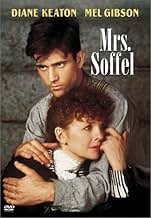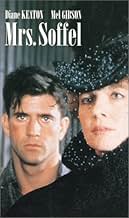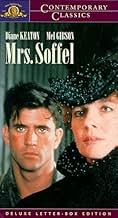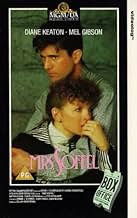NOTE IMDb
6,1/10
3,8 k
MA NOTE
Ajouter une intrigue dans votre langueDiane Keaton stars as a prison warden's wife who falls in love with a death row convict (Mel Gibson.) Believing he's innocent, she helps him and his convicted brother escape.Diane Keaton stars as a prison warden's wife who falls in love with a death row convict (Mel Gibson.) Believing he's innocent, she helps him and his convicted brother escape.Diane Keaton stars as a prison warden's wife who falls in love with a death row convict (Mel Gibson.) Believing he's innocent, she helps him and his convicted brother escape.
- Réalisation
- Scénario
- Casting principal
- Récompenses
- 3 nominations au total
Jennifer Dundas
- Margaret Soffel
- (as Jennie Dundas)
Avis à la une
This one was a nice surprise, I hadn't seen it when it first came out, so I rented it and enjoyed it thoroughly. Diane Keaton and Mel Gibson carry the day in this true tale of a wardens wife who falls for a prisoner. Matthew Modine does a fine job as Mel Gibsons brother, and the entire cast is fine. It's beautifully shot in Pittsburgh, and there is a languid quality about it that I found alluring. Well done all around.
"Mrs. Soffel" is a wonderful movie I have seen many times, but the last viewing was so many years ago I'm watching it right now on TCM.
I'm a sucker for movies whose main characters suddenly, inexplicably make a decision which goes against everything they seem to embody, or at least that which the viewer has come to know about them. That Kate Soffel's story is a true one makes it all the more intriguing.
In early 20th-century America, the lot of a wife, even that of a well-to-do-man and mother to lovely children, was a lonely, empty, barren existence. In a wealthy household with servants, there was very little meaningful work for the mistress of the house to do every day.
Even the layers upon layers of clothes Victorian women wore served no practical purpose except to restrict movement and render their wearers merely decorative. Express your opinions and you got packed off to visit relatives in hopes that maybe the change of scenery would "do you good." There were millions of avenues for creative expression and enterprise that were simply cut off for women.
Good minds went to waste. Souls shriveled and died.
Kate Soffel (Diane Keaton) was the wife of a prison warden in Pittsburgh at the turn of the last century. She served as something of a missionary to the prisoners, giving them Bibles, holding prayer readings with them and hoping to guide them towards remorse and redemption. She never expects to fall in love with one of the inmates. But fall she does, for the charming Ed Biddle (Mel Gibson), who along with his brother Jack, (Matthew Modine) are in jail on murder charges.
Kate is suffocating; the Biddles are desperate. Prone to fits of melancholy and depression, plagued with fears that she is not a good mother and that she has failed her husband -- whom she has come to learn she really doesn't know very well -- Kate, like so many women of her era, is desperate for something to end the tedium, the frustration, the despair. She is a perfect candidate for the dangerous voyage she helps plan and sets out on with the Biddle brothers.
"Mrs. Soffel" raises many ethical and moral issues, among them the divergent path Kate takes from her religious teachings, and the Biddle brothers' guilt or innocence. It can be appreciated equally on one or more levels, but it remains a remarkably restrained depiction of emotions and passion that are anything but.
I'm a sucker for movies whose main characters suddenly, inexplicably make a decision which goes against everything they seem to embody, or at least that which the viewer has come to know about them. That Kate Soffel's story is a true one makes it all the more intriguing.
In early 20th-century America, the lot of a wife, even that of a well-to-do-man and mother to lovely children, was a lonely, empty, barren existence. In a wealthy household with servants, there was very little meaningful work for the mistress of the house to do every day.
Even the layers upon layers of clothes Victorian women wore served no practical purpose except to restrict movement and render their wearers merely decorative. Express your opinions and you got packed off to visit relatives in hopes that maybe the change of scenery would "do you good." There were millions of avenues for creative expression and enterprise that were simply cut off for women.
Good minds went to waste. Souls shriveled and died.
Kate Soffel (Diane Keaton) was the wife of a prison warden in Pittsburgh at the turn of the last century. She served as something of a missionary to the prisoners, giving them Bibles, holding prayer readings with them and hoping to guide them towards remorse and redemption. She never expects to fall in love with one of the inmates. But fall she does, for the charming Ed Biddle (Mel Gibson), who along with his brother Jack, (Matthew Modine) are in jail on murder charges.
Kate is suffocating; the Biddles are desperate. Prone to fits of melancholy and depression, plagued with fears that she is not a good mother and that she has failed her husband -- whom she has come to learn she really doesn't know very well -- Kate, like so many women of her era, is desperate for something to end the tedium, the frustration, the despair. She is a perfect candidate for the dangerous voyage she helps plan and sets out on with the Biddle brothers.
"Mrs. Soffel" raises many ethical and moral issues, among them the divergent path Kate takes from her religious teachings, and the Biddle brothers' guilt or innocence. It can be appreciated equally on one or more levels, but it remains a remarkably restrained depiction of emotions and passion that are anything but.
I skimmed the other comments before writing this one in case I'd missed something, but I think my initial lukewarm reaction to the film, which I saw on Turner Classic Movies, is the one I'll stick with.
I tuned into this movie because of Mel Gibson and also because I also happen to like Matthew Modine and Edward Hermann.
One commenter said something about the director liking strong female characters, but I didn't see Mrs. Soffel as being strong. Yes, she was unfortunate to be born at a time when women were basically seen as appendages to men. Her husband was not terribly understanding. As the movie opens, she is ill. Then she seems to undergo a miraculous recovery after being bedridden for months. My interpretation of this is that she had probably been suffering from a depressive episode. Yes, Mrs. Soffel is weak. Instead of doing something positive to stir her out of her situation, she falls prey to a criminal, who, admittedly, may not have been all bad. I suppose she had formed some sort of romantic image of Ed Biddle. And perhaps he also had a romantic streak. Both characters are shown to be not at all realistic in the way they see life.
I also found the film rather slow-moving, especially at the beginning. I almost stopped watching. Overall I found, though there were some touching emotional moments, especially at the end, that the movie lacked much of a plot and the characters lacked depth. With such a weak script, I think it would be difficult for me to see much for the actors to have worked with and cannot praise their performances. I wouldn't consider the movie to have been a complete waste of my time, but I couldn't really recommend it.
I tuned into this movie because of Mel Gibson and also because I also happen to like Matthew Modine and Edward Hermann.
One commenter said something about the director liking strong female characters, but I didn't see Mrs. Soffel as being strong. Yes, she was unfortunate to be born at a time when women were basically seen as appendages to men. Her husband was not terribly understanding. As the movie opens, she is ill. Then she seems to undergo a miraculous recovery after being bedridden for months. My interpretation of this is that she had probably been suffering from a depressive episode. Yes, Mrs. Soffel is weak. Instead of doing something positive to stir her out of her situation, she falls prey to a criminal, who, admittedly, may not have been all bad. I suppose she had formed some sort of romantic image of Ed Biddle. And perhaps he also had a romantic streak. Both characters are shown to be not at all realistic in the way they see life.
I also found the film rather slow-moving, especially at the beginning. I almost stopped watching. Overall I found, though there were some touching emotional moments, especially at the end, that the movie lacked much of a plot and the characters lacked depth. With such a weak script, I think it would be difficult for me to see much for the actors to have worked with and cannot praise their performances. I wouldn't consider the movie to have been a complete waste of my time, but I couldn't really recommend it.
Continuing my survey/reevaluation of Mel Gibson movies (well, somebody has to do it), I give this one 3 stars out of 4. If I were giving stars. Anyway...beautifully photographed, nicely-directed film of warden's wife (Diane Keaton) in 1901 Pittsburgh, in contact with death-row inmate brothers (Mel and Matthew Modine). Diane's in static marriage with warden Edward Herrmann and four kids; goes to death row to read Bible passages to cons...one in particular...! Mel's waiting' on a hangin' while the darling of local starry-eyed schoolgirls lamenting the handsome con's apparent fate. Diane and Mel strike sparks in this period romance. Film is slow-moving in first half, but stick with it.
Australian director Gillian Armstrong makes great films with strong women characters--her earlier Australian film "My brilliant career" being a perfect example. I watched "Mrs. Soffel" because of my admiration for Armstrong and found that "Mrs. Soffel" could not hold a candle to "My brilliant career" even though American actress Diane Keaton was admirable compared to the Australian actresses in the latter.
Armstrong had the talented Australian cinematographer Russel Boyd (who was responsible for the seminal works of Peter Weir and Bruce Beresford) once again to work with. While Armstrong and Boyd used justifiably darkened interior shots, I had problems seeing anything for long periods and had to rely on the soundtrack!
Armstrong loves to develop the female characters but leaves the male characters totally undeveloped (Mr Soffel and Jack Biddle). This is one reason I prefer the works of Weir and Beresford over Armstrong--even though her latent talent cannot be ignored. It is amazing to see Soffel's daughter getting equal or more prominence in the script than Mr Soffel towards the end.
Mel Gibson has made a name for himself by directing "Braveheart," but I give more credence to his acting phase in Australia ("Tim", "Mad Max", etc.). I am convinced that he is a director's actor--doing well with good directors. In "Mrs Soffel" Armstrong has evidently invested time with Diane Keaton, who carries the film. Gibson only lends support to her thanks more to the script than his acting capabilities.
Most of the fine tribe of Australian filmmakers of the Seventies have drifted to the US to become richer and gain international recognition--but their work in Australia in the Seventies remains unsurpassed.
Armstrong had the talented Australian cinematographer Russel Boyd (who was responsible for the seminal works of Peter Weir and Bruce Beresford) once again to work with. While Armstrong and Boyd used justifiably darkened interior shots, I had problems seeing anything for long periods and had to rely on the soundtrack!
Armstrong loves to develop the female characters but leaves the male characters totally undeveloped (Mr Soffel and Jack Biddle). This is one reason I prefer the works of Weir and Beresford over Armstrong--even though her latent talent cannot be ignored. It is amazing to see Soffel's daughter getting equal or more prominence in the script than Mr Soffel towards the end.
Mel Gibson has made a name for himself by directing "Braveheart," but I give more credence to his acting phase in Australia ("Tim", "Mad Max", etc.). I am convinced that he is a director's actor--doing well with good directors. In "Mrs Soffel" Armstrong has evidently invested time with Diane Keaton, who carries the film. Gibson only lends support to her thanks more to the script than his acting capabilities.
Most of the fine tribe of Australian filmmakers of the Seventies have drifted to the US to become richer and gain international recognition--but their work in Australia in the Seventies remains unsurpassed.
Le saviez-vous
- AnecdotesThe jail used in the movie is the actual Allegheny County Jail that figures in the story. Designed by noted architect Henry Hobson Richardson, built between 1884-1888, it served as a jail until 1995 and is now used by the juvenile and family sections of the Common Pleas Court.
- GaffesA toy electric train shown running around a Christmas tree is of a post-1950 design, as is the track. The train is based on 19th-century locomotive and passenger car prototypes, making it more plausible. However, toy electric trains that even remotely resembled the one shown did not exist by 1901.
- Citations
Kate Soffel: Don't you let them take me alive, Ed. Promise me. Promise me, Ed.
Ed Biddle: I won't, I promise. I won't let them take you.
- ConnexionsFeatured in The Making of 'Mrs. Soffel' (1984)
Meilleurs choix
Connectez-vous pour évaluer et suivre la liste de favoris afin de recevoir des recommandations personnalisées
- How long is Mrs. Soffel?Alimenté par Alexa
- What famous New Age composer wrote the score for Mrs.Soffel?
Détails
Box-office
- Budget
- 11 000 000 $US (estimé)
- Montant brut aux États-Unis et au Canada
- 4 385 312 $US
- Week-end de sortie aux États-Unis et au Canada
- 86 280 $US
- 1 janv. 1985
- Montant brut mondial
- 4 385 312 $US
- Durée1 heure 50 minutes
- Mixage
- Rapport de forme
- 1.85 : 1
Contribuer à cette page
Suggérer une modification ou ajouter du contenu manquant

Lacune principale
By what name was Mrs. Soffel: Révolte et passion (1984) officially released in India in English?
Répondre




































